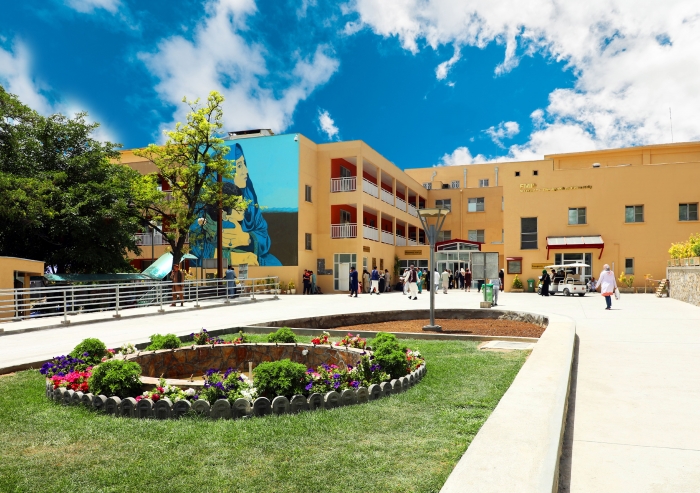Over the course of several years, Ashak’s exemplary TKN service has focused on improving indoor air quality and thermal comfort in many jamatkhanas, particularly in the prayer halls. Through the placement of sophisticated sensors, Ashak has advised many facility managers on how they can improve indoor comfort in their jamatkhanas. In addition, he has been involved in the evaluations of several jamatkhanas globally, which include the Ismaili Centres, and also the Delegation of the Ismaili Imamat building in Ottawa.
Ashak’s 39 years of experience in the heating, ventilation and air conditioning (HVAC) industry is also being utilized on international projects where major HVAC equipment is being upgraded. This currently includes the Ismaili Centres in London, Lisbon and Vancouver. Over the past many years, he has assisted in the design of jamatkhanas (conversions from warehouses) in several cities across Australia, and most recently with New Zealand’s Auckland jamatkhana.
Other key evaluation components in Ashak’s TKN volunteer work include Energy and Water consumption and Greenhouse Gas (GHG) emissions. He has developed a unique STAR rating system, whereby energy, water, indoor air quality and waste management performance of Jamatkhanas can be compared. He contributed significantly to implementation of HVAC strategies for Jamatkhanas (prior to reopening) to address the air borne component of COVID 19. He is also currently volunteering with Aga Khan Agency for Habitat and the Global Centre for Pluralism to streamline GHG data collection and implement strategies to minimize GHG, and develop online training modules for Energy Management.
“Ashak has been instrumental in problem solving and re-imaging major HVAC retrofit projects, which require sensitive modifications to buildings while respecting their original architecture”, said Nazir Mulji, Coordinator, Ismaili Centres.
Despite these competing TKN commitments, Ashak finds the time to help build for the future: by investing in mentorship for the next generation. In February 2019, Ashak took on a TKN assignment to serve as a Mentor for the Reach for the Stars Mentorship Programme (RFS), an initiative of the Aga Khan Education Board for India (AKEB,I). His mentee, a young architect based in Surat, Gujarat, is a sustainability enthusiast and was in need of career direction and guidance.
“I don’t think we could have found someone who was more of a perfect fit than Ashak”, says Zaitoon Khan, a member of the RFS team, who connected Ashak and his mentee, Jiyan Pattharwalla. “Jiyan came into the programme looking for a mentor who had expertise in an extremely niche field called High Performance Building. We were so fortunate to have found Ashak, who is a globally recognized expert in the field”, she says.
Over the course of a year, Ashak worked closely with Jiyan, offering periodic guidance and direction through structured calls every fortnight. Each call had a defined agenda, interspersed with pre-readings and occasional “homework”, to keep Jiyan on track. At the end of the yearlong mentoring track, by March 2020, Jiyan had landed a place at the University of British Columbia to pursue a Masters of Engineering Leadership in High Performance Building. In July this year, Jiyan became one of three recipients from India of the prestigious Aga Khan International Scholarship Programme (AKISP), to fund his Masters at UBC.
Jiyan credits many of these milestones to Ashak’s patient guidance and mentorship. “Learning from Ashak’s rich experience in the field of sustainability and environmental design, was an exceptional experience”, says Jiyan. “Ashak Sir was always there to provide clarity and direction but, more importantly, he helped me diversify my skill set as an architect who now also understands engineering and facility management, for example,” he says. “I really do feel that I have him as a mentor for life”.
The breadth and depth of Ashak’s volunteer service (including several TKN assignments) is outstanding. When asked what has been the inspiration and driving force behind his many contributions, Ashak unhesitatingly says, “My wife Samim. She was an incredible person who supported me all the way, together with her own “seva”, says Ashak. “She led by example, a quiet achiever. Sadly, last November she passed away after a valiant battle with Motor Neuron Disease (MND) also known as ALS”.
Both Samim and Ashak were instrumental in the early settlement of the Ismaili community in Australia and New Zealand (ANZ). Samim, with a Masters in Early Childhood Education, set up the Early Childhood Development (ECD) and Religious Education (RE) facilities in Jamatkhanas in the ANZ region. On successfully completing the IIS’s Professional Teacher Education Program (PTEP), Samim initiated and organized an internationally researched program for the training of new and incumbent teachers in ANZ. The program provided a stable foundation for future ECD and RE centres. In addition to her work with young children, Samim also established the inaugural migration assistance program, which provided support and financial assistance to new immigrants before and after their arrival in Australia or New Zealand.
The ethic of selfless and exemplary volunteer service that has characterized Samim’s and Ashak’s lives is truly inspiring, and his dedicated TKN work with our institutions continues. Even as he pursues his Ph.D., Ashak is shouldering many other assignments, including reviewing the mechanical services design for the upcoming Ismaili Centre in Houston. Both literally and metaphorically, and through projects across the world, Ashak’s work is helping to build a sustainable future.











